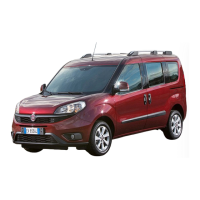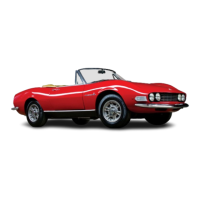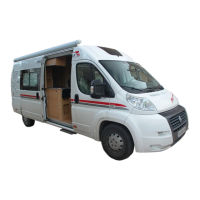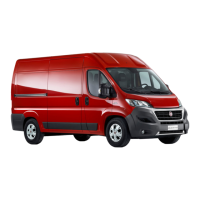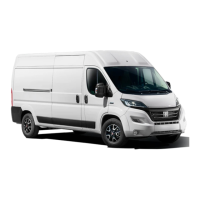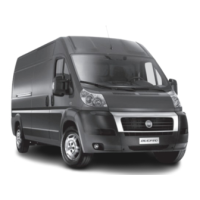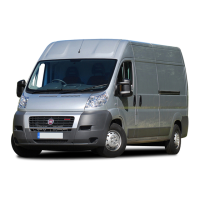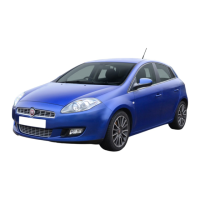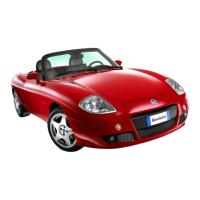Do you have a question about the Fiat Doblo and is the answer not in the manual?
Explains how to interpret directional instructions and figures within the handbook.
Details symbols for warnings and precautions to prevent vehicle damage or personal injury.
Advice on installing electrical accessories and checking system load capacity.
Requirements for installing aftermarket devices, including CE marking and specialized centers.
Guidelines on using radio transmitters and mobile phones inside the vehicle.
Details the operation of keys without and with remote control.
Explains the different positions of the ignition key and safety systems.
Explains coloured labels indicating precautions on vehicle components.
Covers height-adjustable and lockable front head restraints.
Details using, putting away, and extracting rear head restraints.
Instructions on releasing, adjusting, and locking the steering wheel.
Explains the interior mirror's safety device and lever adjustment for normal/antiglare.
Instructions on manually folding door mirrors for narrow spaces.
How to adjust door mirrors manually from inside using a device.
Procedure for adjusting door mirrors electrically using switches.
Instructions on electrically folding and unfolding door mirrors.
Details the activation/deactivation of daytime running lights via ignition key and menu.
Instructions for switching on side lights and dipped headlights.
Instructions for replacing bulbs in the front roof light with movable lens.
Procedure for replacing bulbs in front roof lights with spot lights.
Explains operation of windscreen wiper/washer and 'smart washing' function.
Details the automatic windscreen washer and wiper operation.
Explains activation of rear window wiper/washer in different modes.
Details adjustable side diffusers, air flow control, fixed diffusers, and adjustable center diffusers.
Explains heating/ventilation controls: temp, fan, air distribution knobs and buttons.
Details manual climate control knobs and buttons for temp, fan, air distribution, compressor, recirculation, rear window.
Explains automatic climate control buttons: AUTO, display, MAX DEF, deactivation, compressor, recirculation, fan speed, temp adjustment.
Details buttons on driver door panel for opening/closing front windows.
Describes five switches on armrest for controlling front and rear electric windows.
Explains switch location on inner armrest for rear doors.
Procedure for reinitialising window automatic lifting control after fuse or battery disconnection.
Instructions for opening the bonnet, including lever operation and supporting rod.
Procedure for closing the bonnet, ensuring it is securely shut.
How to open the tailgate using electric handle or remote control.
Details the driver side armrest and its raise/lower adjustment.
Location and operation of the glove compartment.
Details fastener locations for roof rack/ski rack.
Describes roof rails and their use with accessories.
Explains importance of correct headlight alignment for safety.
Details the device that works with ignition key and dipped headlights for alignment.
Instructions on using control panel buttons to adjust headlight alignment.
Contact Fiat Dealership for fog lights alignment check and adjustment.
Lists vehicle safety systems: ABS, EBD, ESP, ASR, Hill Holder, MSR.
Integral part of braking system preventing wheel lock-up and ensuring control.
Completes ABS by distributing brake force between front and rear wheels.
Electronic system controlling vehicle stability and directional control during grip loss.
Indicated by flashing warning light, informing driver of critical stability/grip conditions.
ESC system is automatically activated when the vehicle is started.
Indicates ESC fault via warning light and message, with ASR OFF LED illumination.
Integral part of ESC facilitating slope starting, automatically activated in specific conditions.
Explains how to use seat belts correctly, including fastening, unfastening, and retraction.
Warns driver/passenger if seat belts are not fastened via warning light and acoustic signal.
Devices increasing seat belt protection by rewinding belts in head-on or side impacts.
Provides guidelines and weight groups for child restraint systems.
Details the Universal Isofix system setup using lower metal rings and upper belt.
Describes front airbags for driver and passenger, their design, and non-activation situations.
Explains front side airbags for head and torso protection and their deployment in side impacts.
Instructions for starting petrol and diesel engines, including immobiliser and emergency starting.
Details the handbrake lever operation for engaging and releasing.
Instructions for engaging gears, including clutch pedal operation and reverse gear engagement.
Explains engine stopping and restarting modes, manual activation/deactivation.
Warns driver of low tyre pressure based on cold inflation pressure.
Details the speed limitation function that can be set by the user.
Explains activating, storing, restoring, and reducing vehicle speed with cruise control.
A driving aid for setting off in poor grip conditions by distributing drive force.
Informs driver about obstacles behind the vehicle via intermittent beeping.
Provides guidelines for refuelling petrol and diesel engines, including operation at low temperatures.
Offers tips for fuel saving and reducing harmful emissions through vehicle condition and driving style.
Important notes and warnings regarding towing trailers, including tow hook and speed limits.
Advice on suitable snow tyre types, inflation pressures, and winter features.
Guidelines on using snow chains, including application and speed limitations.
Explains how to turn on and off hazard warning lights and their legal requirements.
General instructions for bulb replacement, including contact checks and fuse checks.
Procedure for replacing bulbs in front light clusters, side lights, and dipped headlights.
Instructions for replacing bulbs in front and rear roof lights.
Introduction to fuses, their function, and how to check for blown fuses.
Instructions for changing a wheel, including tool usage and precautions.
Details the contents of the kit and the inflation procedure.
Procedure for jump-starting a vehicle with a flat battery.
Explains intervention in case of impact, door unlocking, and procedure to restore vehicle operation.
Advises visiting a Fiat Dealership for vehicle lifting operations.
Instructions for attaching the tow hook and towing the vehicle.
Explains the importance of correct servicing for vehicle life, costs, and safety.
Provides tables for scheduled servicing intervals for petrol and diesel versions.
Lists checks and top-ups required every 1,000 km and 3,000 km.
Highlights checks needed more often for specific usage conditions like towing or dusty roads.
Illustrates engine compartment layout for various versions (1.4 95 HP, T-JET, MultiJet).
Recommends replacement of air cleaner or pollen filter by a Fiat Dealership.
Details draining condensation for MultiJet diesel versions.
Describes the limited maintenance battery type and periodic checks required.
Provides information on battery recharging procedure, stating it should be done at a Fiat Dealership.
Instructions for replacing windscreen and rear window wiper blades.
Guidelines for checking tyre pressure, wear, and replacement criteria.
Importance of careful checking of brake and fuel supply system rubber hoses.
Precautions to take when parking the vehicle for longer than one month.
Information on protection against atmospheric agents and advice for preserving paintwork.
Advice on checking interior parts for water, cleaning seats, fabric, and plastic parts.
Details identification codes printed on VIN plate, chassis marking, bodywork paint, and engine marking.
Table listing engine codes for different versions.
Technical specifications for engines: type code, cycle, cylinders, bore/stroke, displacement, compression, power, torque.
Details the fuel supply system type for different engine versions.
Specifies gearbox type (5 or 6 gears), clutch, and drive configuration.
Details front service brakes (self-ventilated discs), rear service brakes (discs), and parking brake.
Describes front suspension (independent MacPherson) and rear suspension (multi-link).
Provides turning circle details and steering type (rack and pinion with hydraulic power).
Details rims and tyres, spare wheel, and wheel geometry (toe-in).
Provides dimensions in mm for short wheelbase, long wheelbase, high roof, and flatbed versions.
Lists unladen weight, max permitted load, payload, towable loads, max roof load, and tow hitch load.
Specifies fluid capacities and recommended lubricants for various vehicle versions.
Recommends specific engine oils, greases, and brake fluids for correct vehicle use and applications.
Lists top permitted speeds for various engine versions after initial vehicle use.
Provides fuel consumption figures (urban, extra-urban, combined) based on European directives.
Lists CO2 emission levels correlated to consumption values based on European directives.
Contains declarations of conformity for vehicle type approvals.
Guidelines for vehicle end-of-life handling and recycling procedures.
Instructions for starting petrol and diesel engines, including immobiliser and emergency starting.
Details the handbrake lever operation for engaging and releasing.
Instructions for engaging gears, including clutch pedal operation and reverse gear engagement.
Explains engine stopping and restarting modes, manual activation/deactivation.
Warns driver of low tyre pressure based on cold inflation pressure.
Details the speed limitation function that can be set by the user.
Explains activating, storing, restoring, and reducing vehicle speed with cruise control.
A driving aid for setting off in poor grip conditions by distributing drive force.
Informs driver about obstacles behind the vehicle via intermittent beeping.
Provides guidelines for refuelling petrol and diesel engines, including operation at low temperatures.
Offers tips for fuel saving and reducing harmful emissions through vehicle condition and driving style.
Important notes and warnings regarding towing trailers, including tow hook and speed limits.
Advice on suitable snow tyre types, inflation pressures, and winter features.
Guidelines on using snow chains, including application and speed limitations.
Explains how to turn on and off hazard warning lights and their legal requirements.
General instructions for bulb replacement, including contact checks and fuse checks.
Procedure for replacing bulbs in front light clusters, side lights, and dipped headlights.
Instructions for replacing bulbs in front and rear roof lights.
Introduction to fuses, their function, and how to check for blown fuses.
Instructions for changing a wheel, including tool usage and precautions.
Details the contents of the kit and the inflation procedure.
Procedure for jump-starting a vehicle with a flat battery.
Explains intervention in case of impact, door unlocking, and procedure to restore vehicle operation.
Advises visiting a Fiat Dealership for vehicle lifting operations.
Instructions for attaching the tow hook and towing the vehicle.
Explains the importance of correct servicing for vehicle life, costs, and safety.
Provides tables for scheduled servicing intervals for petrol and diesel versions.
Lists checks and top-ups required every 1,000 km and 3,000 km.
Highlights checks needed more often for specific usage conditions like towing or dusty roads.
Illustrates engine compartment layout for various versions (1.4 95 HP, T-JET, MultiJet).
Recommends replacement of air cleaner or pollen filter by a Fiat Dealership.
Details draining condensation for MultiJet diesel versions.
Describes the limited maintenance battery type and periodic checks required.
Provides information on battery recharging procedure, stating it should be done at a Fiat Dealership.
Instructions for replacing windscreen and rear window wiper blades.
Guidelines for checking tyre pressure, wear, and replacement criteria.
Importance of careful checking of brake and fuel supply system rubber hoses.
Precautions to take when parking the vehicle for longer than one month.
Information on protection against atmospheric agents and advice for preserving paintwork.
Advice on checking interior parts for water, cleaning seats, fabric, and plastic parts.
Details identification codes printed on VIN plate, chassis marking, bodywork paint, and engine marking.
Table listing engine codes for different versions.
Technical specifications for engines: type code, cycle, cylinders, bore/stroke, displacement, compression, power, torque.
Details the fuel supply system type for different engine versions.
Specifies gearbox type (5 or 6 gears), clutch, and drive configuration.
Details front service brakes (self-ventilated discs), rear service brakes (discs), and parking brake.
Describes front suspension (independent MacPherson) and rear suspension (multi-link).
Provides turning circle details and steering type (rack and pinion with hydraulic power).
Details rims and tyres, spare wheel, and wheel geometry (toe-in).
Provides dimensions in mm for short wheelbase, long wheelbase, high roof, and flatbed versions.
Lists unladen weight, max permitted load, payload, towable loads, max roof load, and tow hitch load.
Specifies fluid capacities and recommended lubricants for various vehicle versions.
Recommends specific engine oils, greases, and brake fluids for correct vehicle use and applications.
Lists top permitted speeds for various engine versions after initial vehicle use.
Provides fuel consumption figures (urban, extra-urban, combined) based on European directives.
Lists CO2 emission levels correlated to consumption values based on European directives.
Contains declarations of conformity for vehicle type approvals.
Guidelines for vehicle end-of-life handling and recycling procedures.
| Brand | Fiat |
|---|---|
| Model | Doblo |
| Category | Automobile |
| Language | English |
